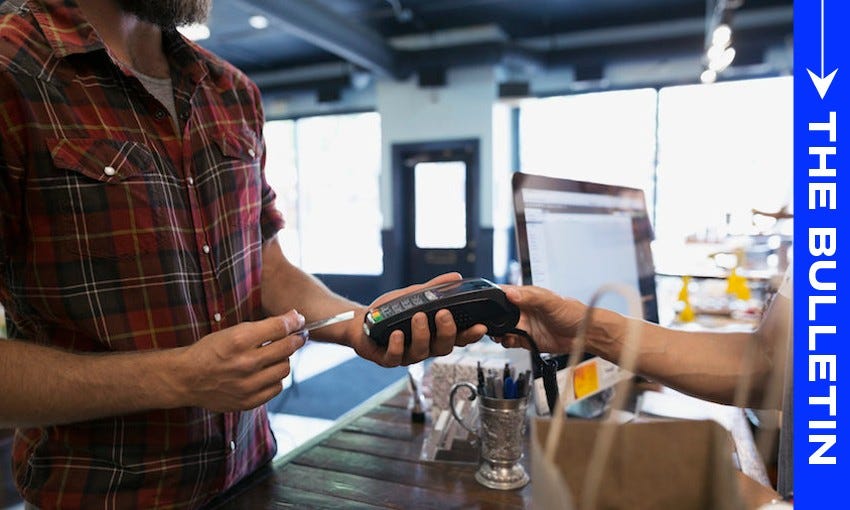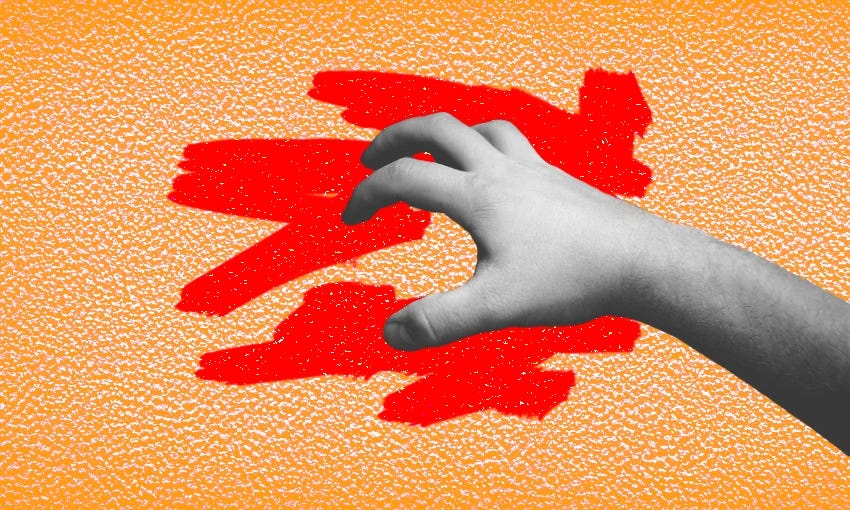Mōrena, and welcome to The Bulletin for Monday, July 29.
In today’s edition: The Greens suffer another blow, the government’s “boot camp” pilot programme kicks off, and New Zealand searches for its first Paris Olympic medal. But first, why tap and go purchase fees are in the spotlight.
The battle over surcharges
Last week, I asked whether there’d be any interest in a bit of a deep dive into what’s been going on with spending surcharges – like PayWave – and the response was an overwhelming yes. So to start the week, let’s do exactly that. On Tuesday, BusinessDesk (paywalled) reported that the Commerce Commission was starting consultation on proposals it hoped would see credit and PayWave surcharges brought down to a maximum of 0.7%. It’s not unusual to see stores charging an extra 2.5% or even 4% on any PayWave purchase, so this would be a sizeable reduction. The Herald’s Chris Keall looked at this last week, noting that despite previous moves to cap fees, charges remained high in some places. The Commerce Commission is considering tighter regulation, but that would still be some months off. The commission’s chair John Small says fees are “too high” when compared with other countries and by reducing the burden on merchants it could also “allow businesses to reduce retail prices as well as surcharges, for the benefit of their customers”.
All of this may make you assume customers are being intentionally ripped off, but Retail NZ’s chief executive Carolyn Young told Ryan Bridge on Newstalk ZB that it was more likely a symptom of a complicated system.
Why it’s so complex
Tom Taylor explained how the fees are charged in a report for RNZ’s Checkpoint back in 2023. In short, banks charge retailers per transaction for the use of PayWave, credit and overseas cards. Each fee is different – international credit cards carry around a 2.5% fee, while PayWave is normally about 0.7% – but most stores only have one terminal and have to average out the cost of all surcharges to cover the different ways people choose to pay. Even then, as the Commerce Commission said at the time, a surcharge of 4% would well exceed the weighted average from the various fees charged by banks. Some outlets, like supermarkets, opt not to charge customers anything for using different payment methods. As Stuff’s Brianna McIlraith explained, that’s because larger stores are able to negotiate fees with the banks, a luxury smaller outlets don’t have, or may find that increased foot traffic simply outweighs the burden.
It’s not just stores that are forced to cover added costs, either. For example, I reported on the issue of carpark surcharges for The Spinoff back in February. These often incur a flat rate, meaning you could be paying as much as an extra 50% on top of the cost of a car park if you’re only stopping for a short time. Legislation introduced by the Labour government to cap fees imposed on businesses came into effect in late 2022, but Consumer NZ has expressed concern that not all savings are being passed onto customers.
Why this matters
Underpinning all of the above is the fact that PayWave and other forms of electronic payment undoubtedly serve an important role. The fees may be high, but nobody is suggesting the solution would be doing away with contactless purchases altogether. For starters, there is a convenience that comes from tap and go that can encourage more spending. How many times have you realised you’re in a shop with only your phone and have relied on Apple Pay, for example. There are other reasons too. It’s no coincidence that PayWave exploded during the Covid-19 pandemic. This Newsroom report from the early stages of the pandemic, when people were acutely aware of how much contact they had while out and about, showed that PayWave served an important role in making people feel safer when at the checkout. It’s a global trend, but the difference is that New Zealanders are paying a lot more for the privilege than many other countries, according to the Commerce Commission. In announcing its plan to try and curb fees, the commission said it could save consumers around $250m a year.
Is cash still king?
The flipside to all of this is: are we becoming too reliant on contactless technology? The cost of using your card at some stores and the recent global IT outage have compounded questions around whether we started to move away from cash too quickly. Some, like my dad, who still pays for basically everything with cold, hard money have been arguing this for years. They’re not alone. The Crowdstrike issue was a good reminder that we can’t go cashless just yet, financial writer Frances Cook told RNZ. “What happens if next time it's a bit smarter and it is an attack, and it is deliberate and it lasts longer?” said Cook. Raphael Franks reported for the Herald last week that the Reserve Bank and the Citizens Advice Bureau had also urged people to have some physical cash, at least for emergencies. That’s all well and good, but contactless spending is here to stay. Surely the least we can expect is transparency around what we’re being charged for using it, and why.
Show your support, join up today!
"Thank you to The Spinoff team for a balanced news, arts, culture, society, for the (mostly) clear sighted writing and, especially, for the intelligent satire. There needs to be space to be able to laugh" – From a Spinoff member.
If you've appreciated our political satire, as well as our journalism, please consider becoming a member today.
Greens to decide on Tana’s future as Pasifika members quit
The Greens have suffered yet another blow during a weekend AGM that was intended to rally the troops. Waatea News has reported a trio of the party’s Pasifika leaders have resigned in protest at the way ousted MP Darleen Tana was treated. An open letter from the three outgoing Green members to the party also expressed concern at the “blatant disregard” for them after the death of Fa’anānā Efeso Collins and evoked the Elizabeth Kerekere saga, saying the co-leaders “manipulated the racist ‘angry brown woman hurting the fragile white woman’ trope for the frenzied media coverage”. In an analysis of the AGM for Newsroom, Sam Sachdeva noted that while the Greens had endured a tough few months, there was “little sign of despair or frustration on display” at the annual conference. And, wrote Sachdeva, even a series of scandals, controversies and tragic circumstances has done little to dent poll support for the party.
Meanwhile, the Greens have still to decide whether to invoke the party-hopping rule that could see now-independent MP Tana kicked out of parliament. The Post’s Anna Whyte looks at that today, reporting that a special meeting has been scheduled for September 1 for delegates to vote on Tana’s parliamentary future. Former Green MPs are among those calling for the party-hopping rule to be used.
Controversial policies in the spotlight after abuse in care inquiry
Today, July 29, sees the launch of the so-called “boot camp” programme for youth offenders, while submitters will be heard at parliament on the proposed repeal of section 7aa of the Oranga Tamariki Act. Laura Walters for Newsroom Pro (paywalled) has looked at this today, writing that scrutiny of the government policies has stepped up a notch in the wake of the final report of the abuse in care inquiry being released last week. The Herald’s Sasha Borissenko (paywalled) has argued that the government’s apology to abuse victims will ring hollow should the military academy scheme go ahead.
Olympics latest
At the pool, Lewis Clareburt has just come in sixth in the men’s 400m medley final.
Why Erika Fairweather can go forth after Paris Olympics “race of the century” fourth.
In pictures: NZ athletes in action on the first day of the Paris Olympics.
Every sport at the Paris Olympics, ranked from least to most fun to watch.
Click and Collect
The PM repeatedly said last week that Health NZ had 14 layers of management. But, reports The Post, the government can’t prove it.
Auckland mayor Wayne Brown’s anti-road cone crusade continues with an opinion piece for Stuff this morning. He argues: “Give us the power to set fees and fines that reflect the scale of disruption.”
Judith Collins, who has previously expressed her love for (or at least fascination with) artificial intelligences makes a first step towards bolstering uptake in New Zealand. (paywalled)
I enjoyed this tribute to the Sunday News which comes off the print after 61 years.
The cost to remove coal tar from Christchurch’s river red zone has sky-rocketed to around $100 million, reports The Press.
The Chills' Martin Phillipps has unexpectedly died at the age of 61.
For months, Jody Winter has been dealing with a maddening, persistent, post-herpetic itch. AI is already straining electricity systems and we’re just at the beginning, explains Shanti Mathias. For the Sunday Essay, Dougal Rillstone on remembering his brother. Whitney from The Traitors NZ takes us through her life in television. And, speaking of, Tara Ward argues that this season of The Traitors NZ is the best reality TV we’ve ever made (editor’s note: I 100% agree).
That’s it for today, thanks for reading. I’ll see you back here tomorrow morning.
Let me know in the comments, or get in touch with me at thebulletin@thespinoff.co.nz, if you have any feedback on today’s issue or anything in the news.
If you liked what you read today, share The Bulletin with friends, family and colleagues.
















Thanks for the work on surcharges. I saw a good clear sign at a bar in Christchurch recently that explained the fees for each type of transaction. It was much better than the usual tiny note taped on, visible only once you get to using the card machine itself.
I resisted Paywave on the basis of security - what if I dropped my card & someone picked it up & thereafter didn't need a PIN to use it? Then COVID came plus my bank clarified that there was a limit on $$ without PIN & lower amounts were covered if the card was lost/stolen - I guess they WANTED Paywave to take off?? The downside still remains that by seldom needing my PIN, I find it hard to remember whether my account is Credit or Cheque (I have 2xcards so same question for both!) and which PIN # on which card...
I like to use my card for most things as it is a form of electronic budgeting - easy to check on expenditure & if you pay off the total balance there's no interest (plus SOME more security as opposed to cash) but after living through Christchurch EQs I will NEVER forgo a small hidden $$ stash for emergencies along with the tinned & dried basic foods for several days of disruption. An older relative puts away cash each week & pays the total Rates bill in full in cash! (to be fair, that is since they discontinued cheques)